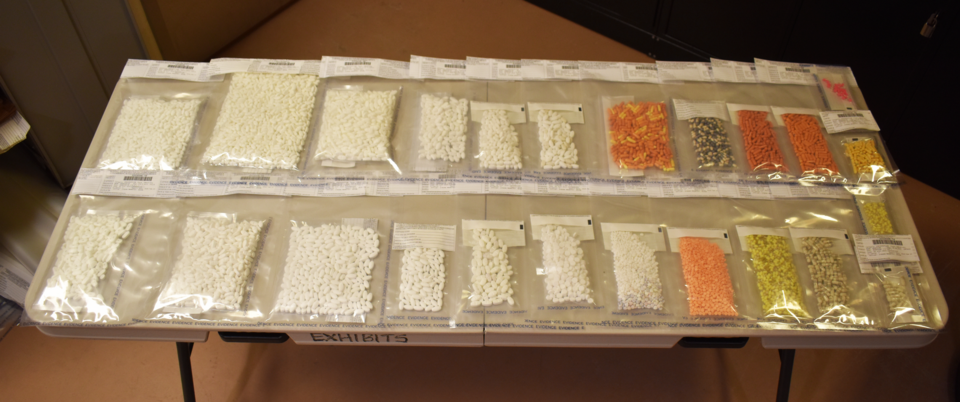Prince George RCMP have seized more than 10,000 prescription pills, thousands of which had been designated for the safer supply harm reduction program, that were being distributed by organized crime groups who were selling them in Canada.
The seizures also included illicit drugs and are the result of multiple police investigations over the past three months by Prince George RCMP’s Street Crew Unit which targeted individuals and groups involved in drug trafficking in the city.
Search warrants were executed in several residences in the city, resulting in substantial seizures of illegal and prescription drugs and cash.
“We have noted an alarming trend over the last year in the amount prescription drugs located during drug trafficking investigations, noting they are being used as a form of currency to purchase more potent, illicit street drugs,” said Prince George RCMP media spokesperson Cpl. Jennifer Cooper.
“Organized crime groups are actively involved in the redistribution of safe supply and prescription drugs, some of which are then moved out of British Columbia and resold. The reselling of prescription drugs significantly increases the profits realized by organized crime.
One seizure alone confiscated more than 10,000 individual prescription pills, including gabapentin, hydromorphone, codeine and dextroamphetamine. Investigators also seized large quantities of suspected fentanyl, cocaine, and methamphetamine.
A second drug bust resulted in seizures of more than two kilograms of suspected cocaine, methamphetamine and cash, as well as thousands more prescription pills, including oxycodone and the safer-supply drugs morphine and hydromorphone.
Police are warning the public that the misuse of prescription medication by anyone is extremely dangerous. As little as one pill can result in a fatal overdose. Drug users are using prescription pills that have been sold to them in bunches containing a variety of drugs. They don’t realize their potency because the drugs have not been prescribed specifically for that individual and that can lead to a fatal overdose.
“People are mixing them and there are going to be people who don’t understand what they are purchasing and see that it is a prescription drug and assume it may be safe,” Cooper told National Post reporter Arian Humphreys. “But if it is not prescribed to you it is not safe.
“If these are getting into the hands of our youth or young adults who may think this is a safe way to get high, it is concerning to us. It’s also concerning that it’s another way for organized crime groups to make money very quickly with little to no effort on their part. This is only perpetuating and possibly exacerbating the problem.”
BC RCMP, in a statement issued on Monday, said the presence of confirmed safer-supply prescriptions are in the minority of drug seizures, adding that while there have been recent investigations that have resulted in notable quantities seized, there is currently no evidence to support a widespread diversion of safer supply drugs in the illicit market in BC or Canada.
In March 2020, B.C. became the first province to prescribe government-regulated opioid alternatives to substance users as a way to prevent overdose deaths from toxic street drugs that are killing on average of six people per day in the province.
In December 2023, 4,212 B.C. residents received prescribed opioid alternatives that mimic the effects of illicit drugs. In February, provincial health officer Dr. Bonnie Henry issued a report calling for expansion of the safer supply program to increase availability and broaden the types of drugs that can be prescribed, while also acknowledging the program creates risks for society.
Cooper realizes this week’s seizures of safer-supply drugs will stir up public debate on how the province is handling the opioid crisis which last year claimed the lives 2,511 British Columbians.
“I would guess this is going to get some political attention because we are pointing out what has been deemed safe is not being kept safe,” Cooper said. “It’s taxpayers that pay for this safe supply through our tax dollars that go towards our health units.
“It’s not only a problem for police, but it’s a problem for everybody who lives here and sees the cause and effects of this continuing to happen.”



